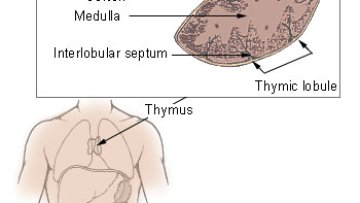Oxford Mathematician Sam Palmer tackles a crucial issue in our understanding of the risks of serious diseases such as cancer.
Ribbons and moduli spaces of stable pairs
Abstract
This talk aims to provide a simple introduction on how to probe the
explicit geometry of certain moduli schemes arising in enumerative
geometry. Stable pairs, introduced by Pandharipande and Thomas in 2009, offer a curve-counting theory which is tamer than the Hilbert scheme of
curves used in Donaldson-Thomas theory. In particular, they exclude
curves with zero-dimensional or embedded components.
Ribbons are non-reduced schemes of dimension one, whose non-reduced
structure has multiplicity two in a precise sense. Following Ferrand, Banica, and Forster, there are several results on how to construct
ribbons (and higher non-reduced structures) from the data of line
bundles on a reduced scheme. With this approach, we can consider stable
pairs whose underlying curve is a ribbon: the remaining data is
determined by allowing devenerations of the line bundle defining the
double structure.
Multi-scale modelling to predict strain in the femoral neck during level walking
Abstract
Femoral neck response to physiological loading during level walking can be better understood, if personalized muscle and bone anatomy is considered. Finite element (FE) models of in vivo cadaveric bones combined with gait data from body-matched volunteers were used in the earlier studies, which could introduce errors in the results. The aim of the current study is to report the first fully personalized multiscale model to investigate the strains predicted at the femoral neck during a full gait cycle. CT-based Finite element models (CT/FE) of the right femur were developed following a validated framework. Muscle forces estimated by the musculoskeletal model were applied to the CT/FE model. For most of the cases, two overall peaks were predicted around 15% and 50% of the gait. Maximum strains were predicted at the superior neck region in the model. Anatomical muscle variations seem to affect femur response leading to considerable variations among individuals, both in term of the strains level and the trend at the femoral neck.
Live-modelling the temporal regulation of mesoderm specification
Abstract
Pattern formation emerges during development from the interplay between gene regulatory networks (GRNs) acting at the single cell level and cell movements driving tissue level morphogenetic changes. As a result, the timing of cell specification and the dynamics of morphogenesis must be tightly cross-regulated. In the developing zebrafish, mesoderm progenitors will spend varying amounts of time (from 5 to 10hrs) in the tailbud before entering the pre-somitic mesoderm (PSM) and initiating a stereotypical transcriptional trajectory towards a mesodermal fate. In contrast, when dissociated and placed in vitro, these progenitors differentiate synchronously in around 5 hours. We have used a data-driven mathematical modelling approach to reverse-engineer a GRN that is able to tune the timing of mesodermal differentiation as progenitors leave the tailbud’s signalling environment, which also explains our in vitro observations. This GRN recapitulates pattern formation at the tissue level when modelled on cell tracks obtained from live-imaging a developing PSM. Our “live-modelling” framework also allows us to simulate how perturbations to the GRN affect the emergence of pattern in zebrafish mutants. We are now extending this analysis to cichlid fishes in order to explore the regulation of developmental time in evolution.
Teaching nonlinear dynamics to biologists
Abstract
There is a need for a new kind of maths course, to be taught, not to mathematics students, but to biologists with little or no maths background. There have been many recent calls for an upgrade to the mathematical background of biologists: undergraduate biology students need to understand the role of modeling and dynamics in understanding ecological systems, evolutionary dynamics, neuroscience, physiology, epidemiology, and the modeling that underlies the concept of climate change. They also need to understand the importance of feedback, both positive and negative, in creating dynamical systems in biology.
Such a course is possible. The most important foundational development was the 20th century replacement of the vague and unhelpful concept of a differential equation by the rigorous geometric concept of a vector field, a function from a multidimensional state space to its tangent space, assigning “change vectors” to every point in state space. This twentieth-century concept is not just more rigorous, but in fact makes for superior pedagogy. We also discuss the key nonlinear behaviors that biological systems display, such as switch-like behavior, robust oscillations and even chaotic behavior.
This talk will outline such a course. It would have a significant effect on the conduct of biological research and teaching, and bring the usefulness of mathematical modeling to a wide audience.
The importance of size in immune recognition
Abstract



